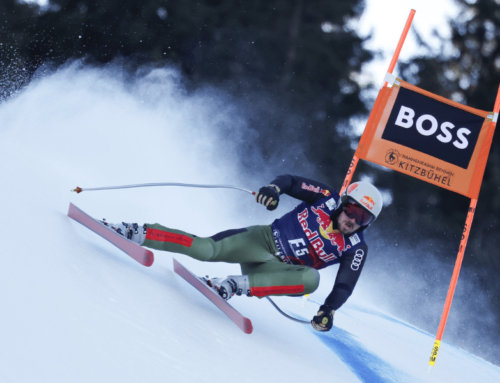Torino Games set to break broadcast records
Torino Games set to break broadcast records{mosimage}The Torino 2006 Olympic Winter Games are expected to be the most watched Winter Games in history, according to a pre-Games broadcast report commissioned by the International Olympic Committee and prepared by Sports Marketing Surveys.
Increased free-to-air coverage in Africa and Asia will see the number of countries and territories broadcasting the Games rise from 160 for the 2002 Salt Lake Games to 200 for Torino 2006. Moreover, new media initiatives, including the first-time use of mobile telephony, will offer sports fans greater choice of viewing experience.
Â
The report indicates that 84 percent of broadcasters (responding to the pre-Games survey) will increase coverage of the Games; two-thirds will increase their live coverage; one-third will increase their prime-time coverage; and almost one-third will be using new innovative broadcast techniques.
Â
More than 3.2 billion people will have access to coverage of the Games, an increase of five percent on the Salt Lake Games with, in Sub-Saharan Africa alone, the number of territories taking free-to-air coverage increasing from just two to 40. The coverage itself will increase by almost one-third, up to 13,520 hours, an average of 845 hours of coverage per day of competition.
Â
New media initiatives will also increase, with broadband Internet coverage the widest and most technically advanced of any Olympic Games. In addition, for the first time, mobile phone subscribers in some territories will be able to watch live or delayed video coverage of the Games. The host broadcast, produced by The Torino Olympic Broadcasting Organisation will be the first to be filmed entirely in High Definition Television. TOBO will use 400 HD cameras to cover the Games, delivering more than 900 hours of HD coverage to all rights holders.
Â
Host country Italy’s coverage will increase by 88 percent on the Salt Lake Games, with RAI broadcasting 244 hours, approximately 15 hours of coverage per day.
Â
Commenting on the projected figures, IOC President Jacques Rogge said, ‘The indications from broadcasters are indeed positive and reinforce our commitment to making the Olympic Games available on free-to-air to as many people as possible. The figures also demonstrate that worldwide interest in the Olympic Winter Games is high. The expected increase in hours of coverage, and the use of new technologies such as High Definition Television, broadband and mobile telephony, are all welcome trends.’
Â
Other highlights coming out of the pre-Games television report include:
Â
Hours of coverage
In most markets, the hours of coverage are set to increase. These include China (up 111 percent), Great Britain (563 percent), Malaysia (1,025 percent) and the USA (12 percent).
Â
NBC’s 416 hours of broadcasting in the United States will include the most live coverage across the most platforms of any Olympic Winter Games, including the Salt Lake Games, and include the most high-definition availability of any Olympic Games.
Â
Coverage in France will be comprehensive, with FR2 & FR3 offering almost 200 hours of airtime, while coverage in Germany on ARD-ZDF will increase by 67 percent, with two digital channels to complement their free-to-air coverage.
Â
Brazil will increase its coverage of the Games by six times that of Salt Lake.
Â
New Media initiatives
There will be more broadcasters supplying broadband Internet coverage than ever before, increasing from eight countries for Athens 2004 to over 20 across four continents. In most cases, this will include live coverage across a number of channels in countries such as France, Germany, Canada, Australia and Japan. France Telecom will provide seven broadband channels of live coverage of the Games, airing over 50 hours a day.
Â
For the first time, there will be live or delayed video coverage of the Olympic Games on mobile phones. This will occur across five continents in almost 20 countries, including France, the UK, Germany, Canada, South Africa, New Zealand and South Korea.
Â
In Europe alone, mobile access to the Games via mobile telephony will be available in 14 countries, through seven mobile operators. In South Korea, Digital Multimedia Broadcast technology will allow mobile phone users to gain direct access to coverage of the Games from Korean Olympic broadcasters.
Â
Olympic Winter Games coverage firstsMongolia (TV5 and MNTV) and Azerbaijan (Lider TV’s) will be showing the Olympic Winter Games for the first time in their history.
Â
BBC viewers in Great Britain will benefit from technological applications in the form of SimulCam and StroMotion to enhance television pictures. StroMotion, which creates stunning trajectory video footage, has never been seen before on British television, and will be used during coverage of skating and snowboarding.
Â
Major market highlights include
Japan’s NHK will broadcast almost 700 hours of coverage, and has highlighted that, despite the time difference, 60 percent will be live sports. Digital/Interactive TV and HDTV will also make a significant contribution to the coverage.
Â
In Korea, KBS will be airing 68 hours of coverage, focussing on High Definition TV broadcast. The Games will also be shown on KBS Sky.
Â
CCTV in China will offer about 17 hours of coverage per day of competition, broadcast on CCTV5.
Â
The BBC’s coverage will offer unprecedented access through BBC2, interactive TV and its sport Web site. Digital viewers will be able to access 500 hours of live coverage, while broadband users will be able to access five channels, running simultaneously and broadcasting different events.
Â
Pan-European broadcaster Eurosport will continue to offer coverage of the Games 24 hours a day.
– Courtesy IOC





















